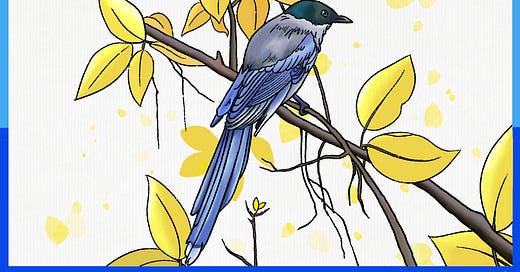Twig 枝丫 Zhīyā is a fantasy series written in Simplified Chinese characters for intermediate level adult readers.
Reviewing the word list prior to reading the chapter may help with enjoyment and comprehension.
在后屋里,张老板走向柜子,心跳得很快,希望这一次会有不一样的结果。他又一次打开柜子找沙漏。沙漏还是没找到。
张老板叹了口气。他把纸和笔从柜子里拿出来,走进他的小厨房。他觉得在这里工作比在后屋好,因为这里有窗户。
他等烧开热水泡茶的时候,用那把用来从身体里切出树的刀子切了一个苹果。他把苹果切成了几块,吃了一块。苹果的味道有点苦,也有点甜。他已经习惯了苦和甜并肩行走。他坐在那个吃饭,读书和写字用的小桌子旁。
窗户开着,热风吹在他脸上。他闻到空气里有雨的味道,但是雨还没下。
张老板听到窗户外面一只灰喜鹊的叫声,他能想象到那只鸟有黑色的头和青色的翅膀。那只鸟的叫声,仿佛就是他心里的感觉:又生气又害怕。
他问自己:忘了把沙漏放在哪儿了吗?他忘了借给了谁,还是谁借走了?如果是别人拿走的,是不是不小心的?如果是故意的,那会是谁?谁会做这样的事?
张老板没有回答。
树:你想得太多了。努力工作吧。
张老板心想:树想得太少了。
树:你想错了。
像树一贯的做法一样,因为想错了,张老板胸口里面剩下的树批评他,让他有一点儿发抖。
像张老板一贯的做法一样,他很快地吸气,呼气,放松,放松。
但是这次,关于努力工作,张老板觉得树说得对。他回去工作了。
史太太想让他请一个书店助理。她是不是觉得他太弱了?!他现在的想法像一辆车一样,他马上让自己的这个想法停下来。他知道她说对了一部分。他应该开始忙着写一个工作说明。
张老板知道,他经营书店的方法跟别的书店老板不一样。他喝了一口茶,开始写了。他写一份不满意,又写了一份还是不满意,桌子下面已经有很多他扔的纸团了。最后张老板终于有一个工作说明可以给史太太看了。
张老板听到窗户外面一只灰喜鹊的叫声。可能是同一只,也可能不是。那只鸟的叫声听起来还是又生气又害怕。但是,张老板感觉好一点儿了。至少,关于这些,他还是可以做点什么的。
Word List
跳 tiào jump
烧开 shāokāi boil
泡茶 pàochá make tea
切出 qiēchū cut out
苦 kǔ bitter
甜 tián sweet
习惯 xíguàn be used to
并肩行走 bìngjiān xíngzǒu walk side by side
吹 chuī blow
闻到 wéndào smell
灰 huī gray or ash-colored
喜鹊 xǐquè magpie
灰喜鹊 huī xǐquè azure-winged magpie
青 qīng azure, cyan, blue, green, bluish-green
翅膀 chìbǎng wings
不小心 bùxiǎoxīn careless, done by accident, unintentional
故意 gùyì deliberate, on purpose, intentional
一贯 yīguàn usual, consistent
做法 zuòfǎ way, way of doing things
批评 pīpíng criticize
发抖 fā dǒu to tremble; to shake; to shiver, to tremble with fear; experienced within a person (vs. 颤抖 chàn dǒu to shudder; to shiver; to shake; to tremble; physically observable from the outside)
吸气 xī qì inhale
呼气 hū qì exhale
放松 fàngsōng relax
请 qǐng to ask, to invite; in job contexts, to hire or to employ
说明 shuōmíng explanation
经营 jīngyíng to run, to manage, to operate (a business or store)
团 tuán to roll or ball up; group; lump; round mass
终于 zhōngyú finally, at last
至少 zhìshǎo at least
Notes
1. 灰喜鹊 huī xǐquè azure-winged magpie is a bird common to Beijing (also 蓝翅山喜鹊 lán chì shān xǐquè 蓝翅 blue-winged 山 mountain 喜鹊 magpie). To hear the call of an azure-winged magpie, click “Listen” on this page.
2. In the illustration by Lear, the 灰喜鹊 huī xǐquè azure-winged magpie is drawn sitting in Shi Taitai’s 金雨树 jīnyǔshù golden raintree. Golden raintree, or Koelreuteria paniculata, is a species of flowering plant in the family Sapindaceae, native to China. Shi Taitai’s golden raintree is first mentioned in 枝丫1:Chapter 8 第八章:太阳来了,太阳离开了.
3. From Mary, our editor, we learn that 喜鹊 xǐquè magpie includes the character 喜 from 喜欢 xǐhuān like. If a magpie appears in the garden, it’s considered a sign of good luck.
4. Although 借 jiè can mean to borrow or to lend, in English, the concept may depend upon direction. A lends/gives an object to B. B borrows/receives an object from A.
In this sentence, I am trying to say:
他忘了借给了谁,还是谁借走了?
Tā wàngle jiè gěile shéi, háishì shéi jiè zǒule?
Did he forget to whom he lent it, or who borrowed it?
更多
枝丫1:《枝丫》第一部
枝丫1:Table of contents | 枝丫1:Chapter 1 | Complete 枝丫1 story, just 汉字
枝丫2:《枝丫》第二部
枝丫2:Table of contents | 枝丫2:Chapter 1 | 枝丫2 story so far, just 汉字
Word lists for review in Hack Chinese.
微故事 Wēigùshì, a series of occasional vignettes featuring objects in the 胡同 and in the lives of 枝丫’s denizens.
Main page: Twig 枝丫: A fantasy novel





